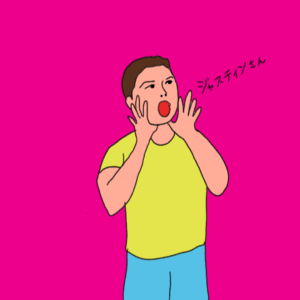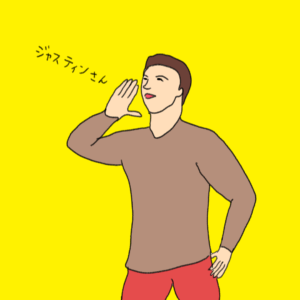Watashiwa firipinjin desu
Watashi wa firipinjin desu. (I am a Filipino.)
Shakaijin desu. (I am a working person.)
Sanjuuyon sai desu. (I am 34 years old.)

Watashi wa … desu
“Watashi” means “I.” Subjects like “I” and “You” are mostly omitted in Japanese, so you need to understand subjects in the context.
“wa” is the indicator that the word before it is the topic of the sentence. As this is a topic marker, it is basically used once in the whole related conversation.
“desu” is for stating someone or something. It follows nouns and adjectives. It is not changed by its subject; it always remains as “desu”. It describes conditions and status, etc.
Words
| Word (pronunciation) | Meaning |
|---|---|
| Jasutin | Justin (name) |
| Firipin | The Philippines |
| jin | people: comes after the names of countries |
| gakusei | student |
| san | Mr, Ms, … : comes after names |
| wa | Particle (a post-particle to indicate that the word before this is to be explained) |
| nanijin | what country’s person(what people = what nationality) |
| sanjuuyon | thirty four: san=three, juu=ten, yon=four |
Expressions
Justin says:
hajimemashite. watashi wa jasutin desu (Nice to meet you, I am Justin.)
namae wa nan desuka (What’s your name?)
Yuuki says:
yuuki desu (I am Yuki.)
jasutin san wa nanijin desuka (What country’s person are you?)
Justin says:
firipinjin desu (I am Filipino.)
yuuki san wa nihonjin desuka (Are you Japanese Mr. Yuki?)
Yuuki says:
hai nihonjin desu (Yes, I am Japanese.)
gakusei desuka (Are you a student?)
Justin says:
shakaijin desu (I am working person.)
Tips
… san
“San” means Mr. or Ms. and it comes after names. It is used to address or refer to someone respectfully in Japanese. “San” is not used for oneself. Therefore, when introducing himself, Justin should say “Jasutin desu”. If someone refers to or talks about Justin as “Jasutin san desu”, it indicates that the person is addressing him politely or talking about him with respect.



… wa
“Wa” is a post-particle that indicates the topic of discussion. It can refer to the subject, object, indirect object, place, direction, and more. You can think of a word before “wa” as the signboard of a sentence. These sentences often provide explanations about something; therefore, the phrases following “wa” are typically noun or adjective sentences, although there are exceptions.
… jin
“Jin” means people and is always used with other words. “Nihon” means Japan, so “Nihonjin” means Japanese. Below are the names of some countries. Put “jin” after the country names and introduce yourself using those terms.
U.S. : amerika
Korea : kankoku
Thailand : tai
India : indo
Egypt : ejiputo
U.K. : igirisu
Australia : oosutoraria
France : Huransu
Brazil : burajiru
Germany : doitsu
Nigeria : naijeria
Saudi Arabia : sauji arabia
Mexico : mekishiko
… ka?
“ka” indicates a question. “Desuka” means “Am I”, “Are you,” or “Is it.” Remember that “desu” and “desuka” always come at the end of the sentence.
Exercise 1
Questions
- Yukisan wa _________________________________desu. ( Yuuki is Japanese. )
- Jasutinsan ______________________________. (Justin is Filipino.)
- _________________________________________________desu. (Justin is a working person.)
Answers
- Nihonjin
- wa firipinjin desu
- Jasutinsan wa shakaijin
Exercise 2
Here are some words that can be used to describe yourself. Use these words to say something about yourself.
| Words (pronunciation) | Meaning |
|---|---|
| gakusei | student |
| sensei | teacher |
| kaishain | working person |
| arubaito | part time job (arbeit) |
| otoko | man |
| onna | woman |
| menbaa | member |
| imin | immigrant |
| kodomo | child |
| otona | adult |
| otoshiyori | old person |
| wakamono | young person |
| ninpu | pregnant |
| hidarikiki | left handed |
| migikiki | right handed |
| inakamono | person from rural area |
| tensai | genius |
| baka | idiot |
| bukkyooto | buddhist |
| kirisutokyooto | christian |
| isuramukyooto | muslim |
